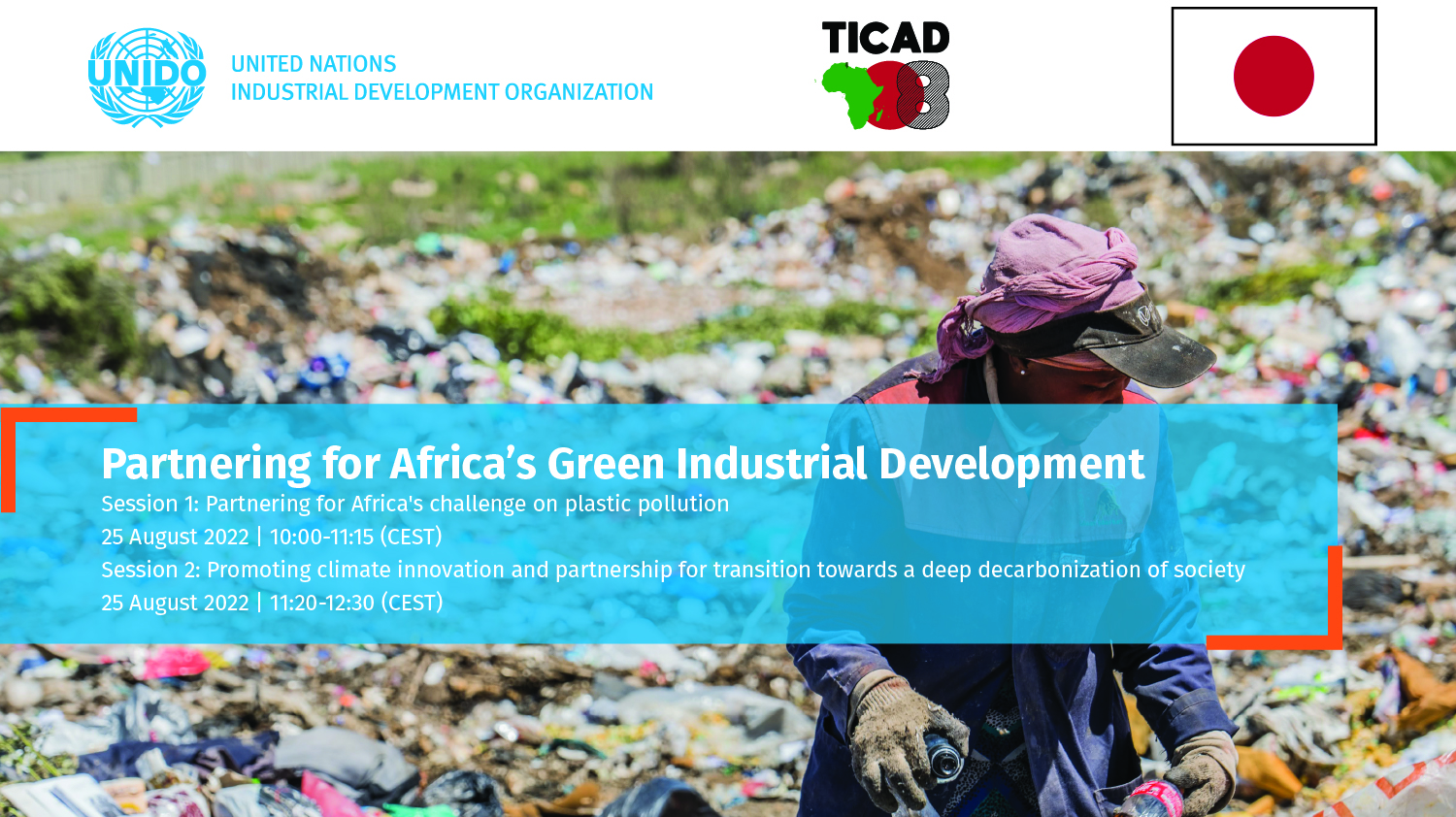UNIDO AND JAPAN SIDE EVENTS AT TICAD8: PARTNERING FOR AFRICA’S GREEN INDUSTRIAL DEVELOPMENT

(Background image credits: Nicholas Murphy)
Throughout their cooperation, the United Nations Industrial Development Organization (UNIDO) and the Government of Japan have sought to create inclusive and sustainable economies in developing countries that are more resilient when facing climate change, pandemics, inequalities (particularly those faced by women and youth), and other global environmental challenges.
As direct responses to the TICAD7 Yokohama Action plan, especially PILLAR II: “Deepening sustainable and resilient society” and Focus area of 2.3 “Enhance resilience against natural disasters exacerbated by climate change and promote sustainable and environmentally friendly urban development”, the Organization will introduce two Japanese-funded UNIDO initiatives during TICAD8, to promote plastic circular economy to mitigate plastic pollution, and to promote climate innovation and partnership for transition towards a deep decarbonization of society.

Session 1: Partnering for Africa's challenge on plastic pollution
UNIDO addresses plastic leakage to the environment, including marine environment, by promoting circular economy practices in industry[1]: through policy suggestions, technical assistance to industry, including capacity development and technology transfer, and awareness building to develop an enabling environment.
The Organization’s work involves industry along plastic value chains including production, consumption, post consumption, waste management, and recycling as designing products should take into consideration of recyclability, end of life disposal, and sustainability. Currently, with funding from the Government of Japan, UNIDO has been implementing several projects to promote plastic circular economy practices in Africa; this session will introduce cases from Africa and Japan on how governments and industry can promote sustainable lifecycle management of single-use plastics to mitigate plastic pollution.
Session 2: Promoting climate innovation and partnership for transition towards a deep decarbonization of society
UNIDO started a new decarbonization project in African countries to contribute to the reduction of greenhouse gases emissions from industrial companies by enhancing capacities for long-term decarbonization modelling and planning at the macro level, and by facilitating effective partnerships at the micro level involving firms from Japan and the beneficiary countries to apply appropriate climate technology and innovation.
To enhance long-term decarbonization capacities, the Organization identifies priority decarbonization projects that are scalable and that show - in a quantitative manner through modeling analysis - the effective policy options and technologies as well as the potential of the Joint Crediting Mechanism (JCM) for identified technologies: it is expected that, by capturing suitable sites and potential of spreading specified technologies, national policies can be developed and reinforced to realize decarbonized societies by 2050. To facilitate effective partnerships, UNIDO launched a new JCM scheme to provide grants as co-financing for the implementation of investment projects; as such, and to build a deep decarbonization of Africa, Session 2 will provide information to identify priority decarbonization technologies and the potential investments as well information on benefits of participating and partnering in the JCM.
Programme:
Venue: Zoom Webinar
Date and Time:
Session 1: 25 August 2022 from 10:00 to 11:15 (CEST)
Session 2: 25 August 2022 from 11:20 to 12:30 (CEST)
|
Session 1 |
||
|
Time |
Topic |
Speaker |
|
10:00 |
Opening Remarks |
Mr. Stephan Sicars, Director EAE/ENV, UNIDO |
|
10:10 |
Case study 1: South Africa |
Prof. Suzan Oelofse, Principal Researcher, Council for Scientific and Industrial Research (CSIR) |
|
10:20 |
Case study 2: Japan |
Ms. Fumika Eto, Deputy Director, Office for Recycling Promotion, Environment Regeneration and Resource Circulation Bureau, Ministry of the Environment Japan |
|
10:30 |
Case study 3: Nigeria |
Mr. Charles Ikeah, Director Pollution Control and Environmental Health of the Federal Ministry of Environment, Nigeria |
|
10:40 |
Case study 4: Egypt |
Dr. Nagwa Elkarawy, Advisor to the Minister of Environment for waste management |
|
10:50 |
Case study 5: Japan |
Mr. Ei Nozaki, CEO, Recotech |
|
11:00 |
Case study 6: Kenya |
Mr. Martin Ochieng, Director of Environment and Sustainability, Kenya Association of Manufacturing (KAM) |
|
11:10 |
Q&A |
|
|
Session 2 |
||
|
Time |
Topic |
Speaker |
|
11:20 |
Introduction |
Mr. Kazumasa Nagamori, Project Manager, UNIDO |
|
11:25 |
Recent Developments of the Joint Crediting Mechanism (JCM) |
Mr. Masaki Nakayama, Researcher, Ministry of the Environment, Japan |
|
11:35 |
Research and analysis on potential investment through advanced technologies towards decarbonized society |
Mr. Tomoki Hirayama, Chief Consultant, Mizuho Research & Technologies Ltd. |
|
11:45 |
Case 1: Projects in Africa |
Mr. Hiroki Ishida, Director, AAIC Partners Africa Limited |
|
11:55 |
Case 2: Projects in Africa |
Mr. Tatsuro Maruhashi, Manager, JFE Engineering Corporation |
|
12:05 |
Case 3: Projects in Africa |
Mr. Hiroaki Ichihashi, President, Mitsubishi Heavy Industries France |
|
12:15 |
Q&A |
|
|
12:25 |
Closing remarks |
Ms. Katarina Barunica, Industrial Development Officer, UNIDO |
To register for the two sessions, please go to:
https://unido.zoom.us/webinar/register/WN_ODlQD_rDTlelz_f4vovHdw
-
Recent Developments of the Joint Crediting Mechanism (JCM)_Mr. Masaki Nakayama
-
Research and analysis on potential investment through advanced technologies towards decarbonized society_Mr. Tomoki Hirayama
-
Case 1: Projects in Africa_Mr. Hiroki Ishida
-
Case 2: Projects in Africa_Mr. Tatsuro Maruhashi
-
Case 3: Projects in Africa_Mr. Hiroaki Ichihashi